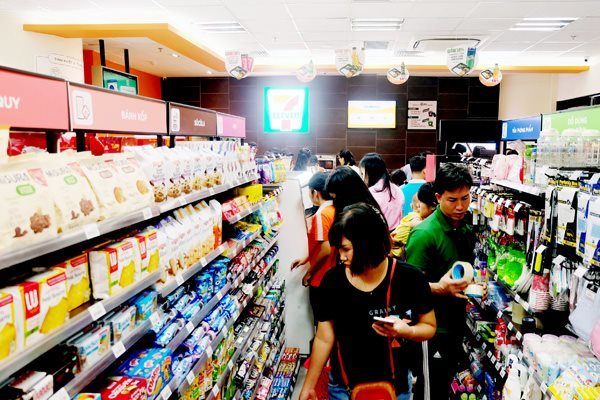Japanese retailers rouse Vietnamese market, despite pandemic
While most enterprises have had to scale down their business during Covid-19 and give back their retail premises to landlords, Japanese retailers have continued to open more shops in Vietnam recently.
The Japanese retail brand Muji in late July opened its first pop-up store on the first floor of Parkson Center in HCM City’s district 1, displaying thousands of product items, including skincare products and clothes.
The opening hour was set at 9.30 am, but Vietnamese youth came one hour before, queuing up for their turn. The shop received 15 clients every 30 minutes and asked people to stand at a distance from each other.
According to Thoi Bao Kinh Te Saigon, the official store will open at the Parkson center on Le Thanh Ton Street by year end.
Miki House, a high-end children’s fashion brand, opened its first store in Vietnam at the Akyruhi Shopping Center in HCM City during the first epidemic outbreak.
Just days later, the well-known Japanese fashion brand Uniqlo opened its first store in Hanoi, at Vincom building on Pham Ngoc Thach street, one of the biggest fashion areas of the capital city. It opened its first store in Vietnam in HCM City last year. It now has two stores in the city.
Meanwhile, Matsumoto Kiyoshi plans to open its first shop in Vietnam in the near future.
The newcomers have added their names to the long list of Japanese retailers present in the Vietnamese market over the last five years.
| While most enterprises have had to scale down their business during Covid-19 and give back their retail premises to landlords, Japanese retailers have continued to open more shops in Vietnam recently. |
JETRO’s (Japan External Trade Organization) HCM City Chief Representative Hirai Shinji said the organization has found a considerable increase in Japanese investments in non-production sectors recently. These include investments by retailers, such as Aeon, Family Mart, MiniStop and 7-Eleven.
Long-term plan
Vietnam has become more attractive to Japanese enterprises thanks to stable economic growth and high political certainties.
Ryohin Keikaku began eyeing the Vietnamese market three years ago and officially made public the plan to join the market in 2019.
While trying to open more new stores in Vietnam, Muji in early July announced its restructuring of its business division in the US, shutting down shops which could not bring profits. The brand also bore pressure in its home country of Japan with sales down by 50 percent when the epidemic was at its peak in April and May.
It took Miki House five years to survey the Vietnamese market and choose a partner.
According to Phan Thanh Tan, chair of Akuruhi, the partner, if the first store succeeds, the company will open two more shops in HCM City, and will consider opening shops in Hanoi and Da Nang.
The General Stastistics Office (GSO) reported that despite Covid-19, revenue from goods and service sales in Vietnam in the first seven months of the year increased by 3.6 percent compared with the same period last year, reaching VND2.218 trillion.
Kim Chi
Source: https://vietnamnet.vn/en/business/japanese-retailers-rouse-vietnamese-market-despite-pandemic-667991.html


 English
English




